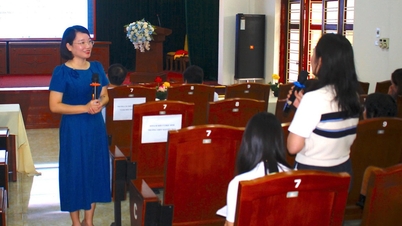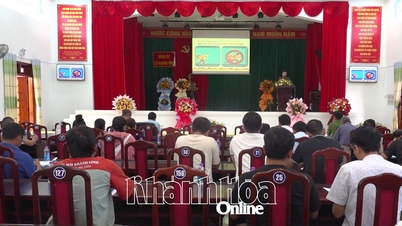For a long time, the problem of lisping and confusing the two consonants n and l has been quite common in some localities in the Red River Delta. It is worth mentioning that this inaccurate pronunciation does not originate from physiological and pathological causes but mainly due to the influence of regional dialects. According to educational psychology researchers, in addition to the factor of the local cultural environment, contact and imitation of others who lisp easily make children unconsciously form the habit of mispronouncing. If not corrected from a young age and maintained with regular and continuous practice of correct pronunciation, when grown up, people are likely to have the problem of lisping and confusing the consonants n and l.
 |
| Illustration photo: vietnamplus.vn |
Realizing the importance of standardizing Vietnamese for teachers and students, the education sector of Hung Yen province has just deployed educational institutions throughout the province to overcome the situation of mispronouncing the two consonants n and l for staff and teachers and to overcome the situation of speaking and writing incorrect spellings between these two consonants for students. All levels of education from preschool, primary, secondary, high school, vocational education centers, and continuing education must consider this as one of the practical tasks to contribute to improving the quality of language education, forming the habit of using Vietnamese accurately and clearly for teachers and students.
The confused pronunciation of the consonants n and l is not simply a linguistic deviation, but it also reflects a deviation in human behavior and communication style. Do not simply assume that someone who speaks incorrectly or reads incorrectly can only cause instant laughter for the listener in a specific situation. The more significant consequence is that the confused pronunciation of the consonants n and l not only makes the person involved lack confidence in communication but also affects the ability and effectiveness of exchanges, presentations, and teaching in schools and on forums. In fact, there have been high-ranking officials and politicians who confused the consonants n and l while speaking and speaking in front of thousands and tens of thousands of people, thereby losing the "sacredness" of the leader and negatively affecting the transmission of political and social messages to the general public.
From a cultural perspective, those who still stutter and misspelled the common language (especially teachers, officials, civil servants, public employees...) without being determined and persistent in overcoming and correcting it are conservative because they do not practice, absorb, and learn the correctness, goodness, and beauty of the standard Vietnamese language. As a National Assembly delegate said, when those who teach and impart knowledge and beliefs to the younger generation still stutter and misspelled their mother tongue, it will affect the reputation of the national education system.
It can be said that the launching and requesting of teachers and students to correct and correct their pronunciation of the consonants n and l, and more broadly, to use Vietnamese correctly, not only contributes to preserving the purity and beauty of the national language but is also a practical action to strengthen order and discipline, and improve the quality of teaching and learning Vietnamese and Literature in general schools. To build a solid foundation of personality and realize the goal of comprehensive education for the young generation, we must start focusing on such practical and specific actions.
NGUYEN HONG SON
* Please visit the section to see related news and articles.
Source: https://www.qdnd.vn/van-hoa/doi-song/sua-ngong-de-chuan-hoa-tieng-viet-849809


![[Photo] Standing member of the Secretariat Tran Cam Tu works with the Standing Committee of the Party Committee of the Ministry of Health](https://vphoto.vietnam.vn/thumb/1200x675/vietnam/resource/IMAGE/2025/10/10/1760079818773_image-4-6972-jpg.webp)

![[Photo] "Exposing letters" in the flood center of Lang Son](https://vphoto.vietnam.vn/thumb/1200x675/vietnam/resource/IMAGE/2025/10/10/1760080117518_ndo_br_z7101324112737-07cd4d1c01801a8ccf4ae0cbaf31c4a3-507-jpg.webp)

![[Photo] Unique Phu Gia horse hat weaving craft](https://vphoto.vietnam.vn/thumb/1200x675/vietnam/resource/IMAGE/2025/10/10/1760084018320_ndo_br_01-jpg.webp)
































































































Comment (0)